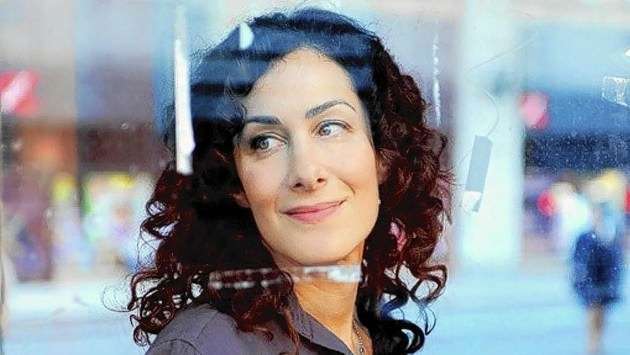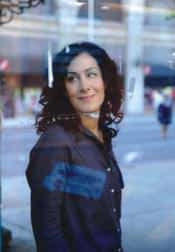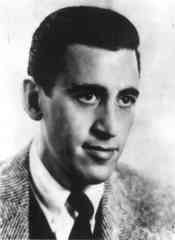Catcher in the Rye—the quintessential coming of age novel—made J.D. Salinger one of the most famous American authors of all time. Though it was first published almost 65 years ago, it is still an iconic book in the American canon, and its once reclusive author, who 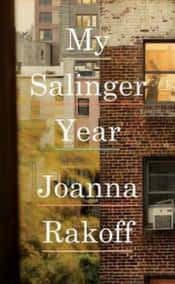 died in 2010, still holds a prominent place in the hearts of his fans. We recently sat down with author Joanna Rakoff, whose new memoir, My Salinger Year (Knopf, June) details the year she spent working for J.D. Salinger’s literary agent, to ask her thoughts on what it means today to come of age, and how she was affected by her relationship with one of the most mysterious literary figures of our time.
died in 2010, still holds a prominent place in the hearts of his fans. We recently sat down with author Joanna Rakoff, whose new memoir, My Salinger Year (Knopf, June) details the year she spent working for J.D. Salinger’s literary agent, to ask her thoughts on what it means today to come of age, and how she was affected by her relationship with one of the most mysterious literary figures of our time.
BOOKTRIB: What do you think it means, today, to “come of age” and how does that affect the stories that are told in this genre?
JOANNA RAKOFF: Well, I’m certainly not the first person to suggest that American kids come of age far later than in previous eras. The ways in which the world economy, contemporary culture, evolving family structures, and ideas about children have conspired to postpone the onset of adulthood into, say, one’s 30s.
Regardless, I suppose “coming of age” today—as a literary construct, that is—still holds rather the same meaning as it did when Salinger wrote Catcher. Coming into an awareness of oneself, of the world in which one lives and that one isn’t at the exact center of it, coming to understand the constructs and ideas that invisibly keep that world spinning. Understanding that all is not as it seems.
In My Salinger Year much of my own coming of age has to do with discovering that my boss—and all the adults around me, including my own parents—is a much more complex person than I initially imagined, that her life outside the office (and even inside it) is vast and rich and complicated.
BT: Your debut novel, A Fortunate Age, depicts recent college graduates building their adult lives in Brooklyn during the late 90s, just as you were during the year you spent working for J.D. Salinger’s literary agent. How did writing a memoir about this same time and place differ from writing the novel?
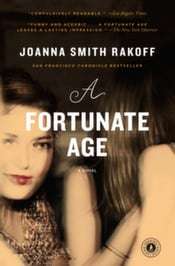 JR: I had a lot of trouble writing My Salinger Year, as memoir wasn’t something that came naturally to me. For a full year, I fretted, I procrastinated by doing research, I freaked out. And then, a friend of mine—the novelist Marie Mockett, who was also working on a memoir—said, essentially, “Is this really such a big deal? Isn’t this kind of the same story as A Fortunate Age? It’s your story. Just think of it as a novel.”
JR: I had a lot of trouble writing My Salinger Year, as memoir wasn’t something that came naturally to me. For a full year, I fretted, I procrastinated by doing research, I freaked out. And then, a friend of mine—the novelist Marie Mockett, who was also working on a memoir—said, essentially, “Is this really such a big deal? Isn’t this kind of the same story as A Fortunate Age? It’s your story. Just think of it as a novel.”
The truth is that it’s not even remotely the same story as A Fortunate Age, a novel that was largely read as autobiographical, but was in fact pure invention that drew from my own observations and experiences. But Marie saying that unlocked something in me: I saw that I needed to think of the memoir as a novel, and to think of myself as a character.
BT: When you started at the agency, you’d never read any of Salinger’s work. How do you think this affected your relationship to him, and to his many fans whose letters it was your job to read and respond to?
JR: I’m pretty certain that it made me much less nervous to speak with him. I mean, I understood that he was, er, the most famous living American writer, of course, and that the second he called the entire office snapped to attention, but because I hadn’t read his work, this understanding was utterly intellectual. And, I suppose, it also led me to respond to the fans with distance and empathy. I was never tempted, for instance, to engage in their speculation about whether Franny is pregnant or just in the midst of an existential crisis, because I truly had no idea. But I could see, rather clearly, the extraordinary ways in which Franny had allowed a Deerfield Academy junior who wrote to Salinger to see beyond the constraints of her particular life, or to feel less alone.
BT: In the opening pages of the book you describe working at a literary agency as the “socially acceptable” way to be a writer. What did you learn in this year that gave you the courage to leave the agency and pursue another path for yourself?
JR: Well, on a practical level, I learned that I could be writer; that I could make a living as a writer. That I didn’t need to hide in an office job. Working at the Agency dramatically demystified things for me. I learned that there were options 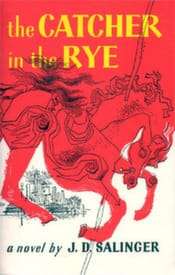 other than living in an apartment without a sink and eating ramen every night.
other than living in an apartment without a sink and eating ramen every night.
But I also learned that writing is work and that being a writer means sitting down and writing every day, not jotting down the first line of a poem when it happens to occur to you. Salinger talked about this, in our brief phone conversations, and it had a huge impact on me. But I also simply began to feel the truth of this—the coolie labor of writing—and to enjoy waking up and writing more than anything else. And the fan letters: Once I began writing long, utterly inappropriate responses to the Salinger fans that became my favorite part of the job. I wrote the letters as myself—not as Salinger—but the version of myself who wrote those letters was a character, a narrator, who was able to speak with greater authority about Salinger, the world, everything, than 24-year-old Joanna Rakoff ever could. It was a huge lesson.

